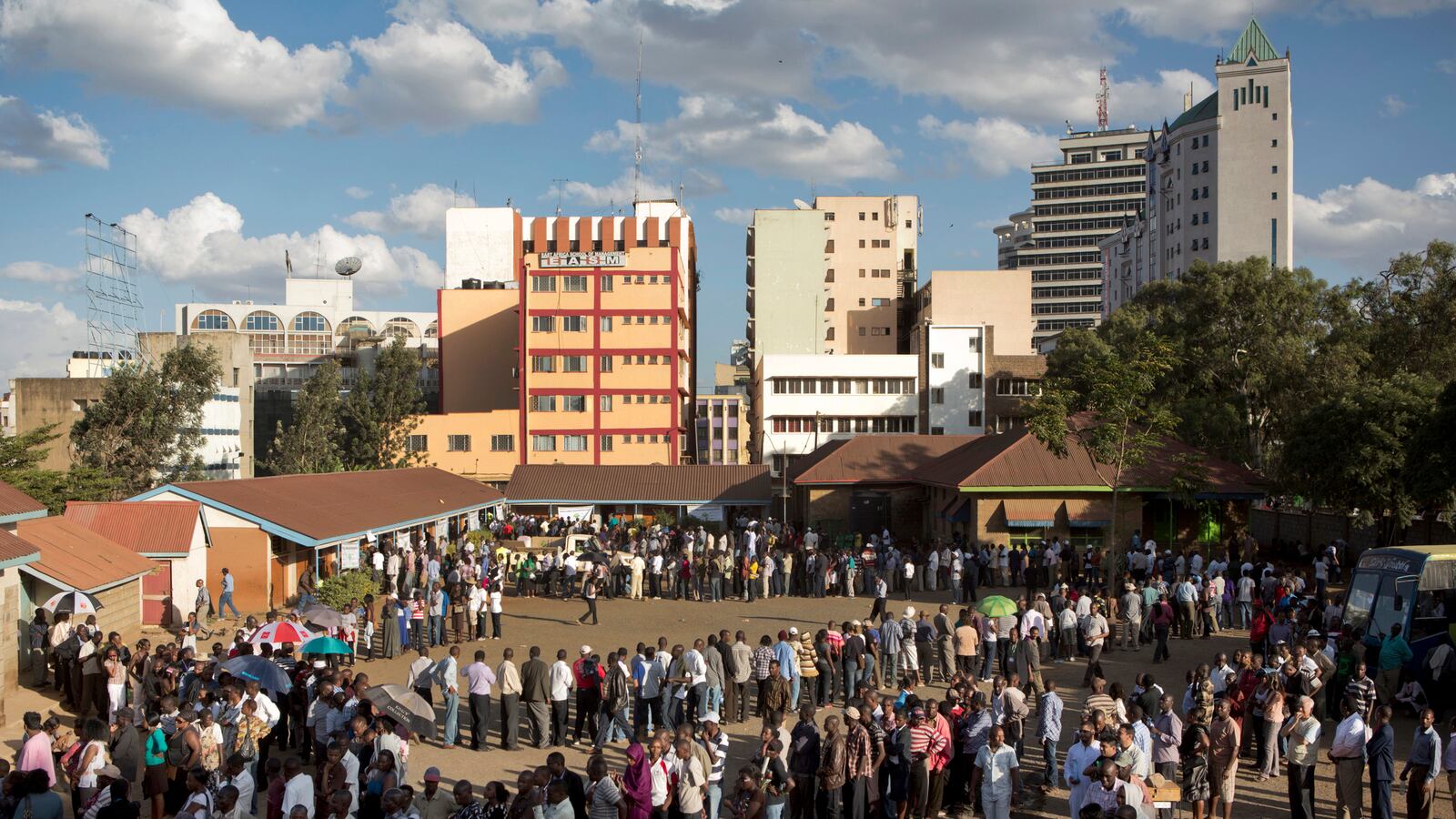The Kenyan capital of Nairobi was electric this morning well before the sun rose, as voters made their way to neighborhood polling stations in what’s being called the country’s most important election since independence. After the last presidential election in 2007 disintegrated into a deadly dispute, leaving an estimated 1,300 people dead and four prominent Kenyans on trial at the International Criminal Court on war crimes charges—including a top presidential contender and his running mate—Kenyans face a crucial test to try and break out of the cycle of violence that has marred every election since the early 1990s.

Christine Nyegenye, a fishmonger in Nairobi’s Kibera slum, said she wasn’t surprised that the city had come to a standstill as people went to the polls. There were concerns in the lead-up that some registered voters would not turn out due to fears about security; the government deployed nearly 100,000 police, and soldiers in riot gear circulated in army trucks. But Nyegenye said she and her friends were not deterred. “This time we are so eager to vote. Of course, we want change,” she says. She had waited in line for five and a half hours—half the time some voters in other parts of the city reported waiting.
“Turnout has been huge, which is a sign of the commitment of the Kenyan people to democracy,” U.S. Ambassador Robert Godec told The Daily Beast while he visited a large polling station downtown. He added that he found the patience voters had shown while waiting hours to cast their votes “inspiring.”
Messages of peace—on billboards (even those doubling as advertisements), editorial pages, graffiti, Twitter—are ubiquitous. The Daily Beast met Kibera artist Solo Muyundo, known as “Solo7” while he was painting the words “PEACE WANTED ALIVE” on a sidewalk running along a busy road in the slum. “When people were looting and torching houses [after the 2007 election], I went around painting messages,” Solo7 says. Today, he got started early.
On the eve of the vote, Kenya Chief Justice Willy Mutunga emphasized the importance of the election in consolidating the progress Kenyans made when they approved a new constitution in 2010. “To all my 14+ million VOTING compatriots: Going forward, vote peacefully tomorrow so as to breathe LIFE into the CONSTITUTION,” Mutunga tweeted to more 105,000 followers. Judicial reforms are central among the countrywide changes brought about by the new constitution, and polls show that most Kenyans have faith in the courts to help avoid a repeat of violence.
But tension is palpable, and at times the constant calls for peace seem to reveal how fragile this moment in Kenya is. A dozen people, including six police officers, were attacked and killed overnight in an attack blamed on a separatist movement in Kenya’s coastal region. It was unclear whether the attack was election-related, but the Kenyan police chief said he had sent an additional 400 officers to the area.

And with a history of elections marred by rigging, voters were particularly sensitive and vocal about hints of irregularities.
“Where’s the laptop? The laptop is not here!” shouted out a young man raising his finger into the air as the crowd in the increasingly bunched-up line jostled him forward. Election officials manning that queue delayed opening because a laptop to access the database of voters’ fingerprints had gone missing. “I registered electronically. I can’t vote manually! We need this issue to be addressed!” A policeman with a baton approached the scene and urged the frantic young man to be calm while elections officials in neon yellow vests sorted through a hardcopy list of voters’ names.
Various renditions of this scene played out as the process got underway when polls opened at 6 a.m., or in some cases some time after. Standing under a white tent at a polling site set up in a wide field in Kibera slum, Bernard Lukongo said the situation at that early hour was “not quite good.” He was working as an observer from Prime Minister Raila Odinga’s ODM party. “A lot of people here are not educated, let’s be honest. So when an old mama comes here and sees all of these papers, it isn’t what she expects.”
The new constitution created a number of positions that Kenyans are now electing for the first time, including county governors, senators, and National Assembly seats set aside for women. The ballot papers for each of the six seats are color-coded to match their respective ballot boxes. Election commission officials are on hand to escort voters who need assistance through the process, under the watch of party observers as a measure against vote rigging.
Even after waiting for hours, first in the pitch dark and then in the blazing sun, voters sounded patient, if exasperated. “I’ve been here since 3 [a.m.], and it’s even more confusing now than it was then,” said a middle-aged woman weaving through the throngs of people while trying to figure out which staggeringly long line she was supposed to wait in.
Isaack Hassan, the head of Kenya’s Independent Electoral and Boundaries Commission, turned up at a large polling station in downtown Nairobi shortly after the polls were scheduled to close this evening. Hundreds of voters still stood in the school grounds, and Hassan emphasized that registered voters through the gate by the 5 p.m. close would be allowed to vote.
“In the morning, it went smoothly, but we’ve had a very big turnout. We needed more polling stations,” Hassan told The Daily Beast. “Luckily there is [electricity] here, so they can continue into the night. Hopefully we’ll get this done sooner rather than later.” A polling station official predicted the school would stay open until midnight to process the remaining voters.
The electoral commission is scheduled to announce official results by March 11.






